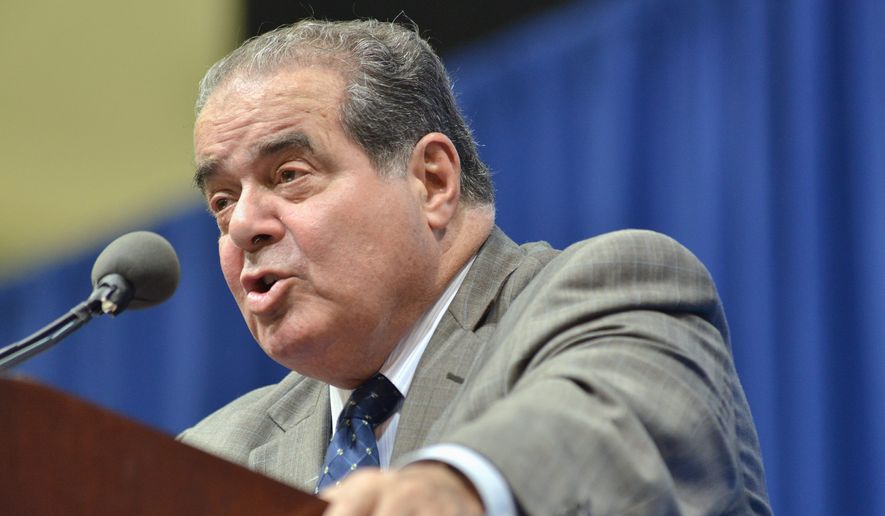LAKEWOOD, Colo. — Supreme Court Justice Antonin Scalia said Wednesday that secularists are wrong when they argue the Constitution requires religious references to be banished from the public square.
Justice Scalia, part of the court’s conservative wing, was preaching to the choir when he told the audience at Colorado Christian University that a battle is underway over whether to allow religion in public life, from referencing God in the Pledge of Allegiance to holding prayers before city hall meetings.
“I think the main fight is to dissuade Americans from what the secularists are trying to persuade them to be true: that the separation of church and state means that the government cannot favor religion over nonreligion,” Justice Scalia said.
“That’s a possible way to run a political system. The Europeans run it that way,” Justice Scalia said. “And if the American people want to do it, I suppose they can enact that by statute. But to say that’s what the Constitution requires is utterly absurd.”
Justice Scalia’s remarks came as part of a day of public appearances in Colorado. He lectured students on the Commerce Clause during a morning class, and then received an honorary doctorate prior to his luncheon speech from CCU President Bill Armstrong.
“At no place on Earth does Justice Scalia have as many admirers as he does on the Colorado Christian University campus,” said Mr. Armstrong, a former U.S. senator.
SEE ALSO: Mitt Romney proves to be a draw in Colorado races
Justice Scalia was slated to give the keynote address Wednesday night at a conference at the University of Colorado Law School in Boulder.
The high court’s longest-serving justice, Justice Scalia said that even President Thomas Jefferson, who’s credited with creating the concept of separation of church and state, wrote in the Virginia Declaration of Religious Freedom that, “God who made the mind of man made it free.”
“We do him [God] honor in our pledge of allegiance, in all our public ceremonies,” Justice Scalia said. “There’s nothing wrong with that. It is in the best of American traditions, and don’t let anybody tell you otherwise. I think we have to fight that tendency of the secularists to impose it on all of us through the Constitution.”
The biggest danger lies with judges who interpret the Constitution as a malleable document that changes with the times, he said.
“Our [the court’s] latest take on the subject, which is quite different from previous takes, is that the state must be neutral, not only between religions, but between religion and nonreligion,” Justice Scalia said. “That’s just a lie. Where do you get the notion that this is all unconstitutional? You can only believe that if you believe in a morphing Constitution.”
Given that he doesn’t believe in the “morphing Constitution,” Justice Scalia said his job is relatively stress-free.
SEE ALSO: U.S. Navy sailors harbor widespread distrust of senior leadership: report
“If I had the other view of the Constitution — that it was an empty bottle, which was to be filed by my court, and it was my responsibility to decide … all these massive ethical questions — if they were all my call, I couldn’t sleep at night,” Mr. Scalia said. “And some of my colleagues have said, ’Oh, we agonize a lot.’ I don’t agonize at all. I look at the text, I look at the history of the text. That’s the answer. It’s not my call.”
He noted that references to God by government officials are already forbidden in many European countries, thanks to a widespread policy of secularism.
“There are those who would have us adopt that rule for America, and if they want us to adopt that rule, let’s put it to a vote,” Justice Scalia said. “But they want to do it through the Supreme Court. And that is simply not what our Constitution has ever meant.”
Appointed to the court by President Reagan in 1986, Justice Scalia joked during a question-and-answer session that he doesn’t let the pressure of the bench get to him.
“What can they do to me? I have life tenure,” Justice Scalia said. “It’s even better than academic tenure.”
• Valerie Richardson can be reached at vrichardson@washingtontimes.com.




Please read our comment policy before commenting.